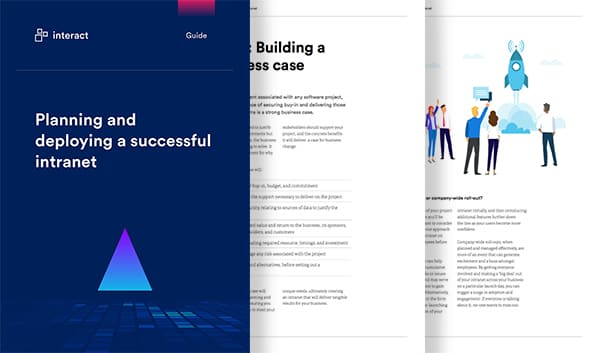We need to be shouting about CSR – to our employees
As organizations, we’re quick to publicise how ethical we are to win and reassure our consumers. Why aren’t we doing the same to our employees?

When it comes to corporate social responsibility, the key is in the name: it centers around how we, as corporations, contribute responsibly to society. CSR considers aspects such as our social, economic and environmental impact; the way our organization positively (or, perhaps, negatively) impacts the communities in which we operate and the decisions we make in response.
So, if the focus is all on the external, why does CSR matter to our employees? Why should we be making more noise around what we do?
Increase workforce productivity and happiness
Corporate social responsibility and your staff
Corporate social responsibility is a capture-all term that encompasses a broad range of different issues and obligations. CSR programs will vary from one organization to the next, depending on their industry, priorities and values. While Starbucks focus on sustainability and ethical agricultural practices for sourcing their coffee, for example, grocery chain Kroger is committed to a campaign for #ZeroHungerZeroWaste.
Organizations recognize the demand of the consumer for accountability, transparency, and ethical practices from the businesses from which they purchase. CSR is now a key differentiator, and consumers vote with their dollars. But demonstrating that your company cares about more than turning a profit is also increasingly important to employees. How we act has a direct impact on how our staff feels about our organizations and their jobs.

Here’s how CSR benefits our organizations by impacting our employees:
#1: Recruitment:
The next generation of employees is seeking ‘more than just a paycheck’ – they want purpose.
Employees want to work for organizations and causes they believe in; CSR now factors into the decision-making process when considering a role and is a competitive edge to secure the best talent.
55 percent of employees say they would opt to work for a socially responsible company even if the salary was less, while 51 percent will not work for a company without strong CSR commitments.
#2: Greater levels of engagement and retention:
CSR practices don’t just attract employees to a business – they help keep them there.
Feeling positive about the contribution and impact their organization makes to the ‘greater good’ is shown to drive higher levels of engagement, high-quality connections and drive creative involvement. Your staff will be happier, more innovative, and more committed to both their jobs and the organization as a whole.
#3: Identification with the company – and greater citizenship:
Getting buy-in from employees into your organization, its direction, mission, and purpose can be a huge challenge. When staff believe in the causes and ethical practices their organization champions, they experience a greater sense of identity with the business as a whole.

Organizations that show socially responsible behaviors are also more likely to see those behaviors mirrored in their staff: for example, staff who are more willing to go above and beyond for their colleagues, or show social responsibility in the way they approach their roles.
#4: Confidence and skills:
When employees are encouraged to engage and participate in CSR activities, they often step outside their comfort zone and go beyond the scope of their day-to-day jobs.
Depending on the nature of the activity – whether volunteering, fundraising, raising awareness, giving back to the community, implementing greener practices or others – staff will exercise team building, problem-solving, creativity, leadership responsibility and more. They may pick up more specialist skills too: such as project or event management, budget control, or PR. CSR helps your staff grow both personally and professionally; benefits that will domino into their working lives.
Increase workforce productivity and happiness
The bottom line is, CSR is good for YOUR bottom line.
How do we make corporate social responsibility front-and-center internally?
If you’re like many companies, your CSR communication efforts focus on the communities they support, more than your employees.
Don’t let your CSR efforts become outdated policies hidden on a mandatory page on your intranet and corporate website. We’ve shown how CSR can transform the employee experience of the workplace – so it’s time to make our stance known, inside as well as out. Here’s how to get CSR on the employee agenda.
Give power to your employees.
Nothing secures buy-in and a sense of ownership more than, well, owning a decision.
Give your employees to power to decide what’s important to them when it comes to CSR. Ask staff to vote for the charities or causes they want to support; to put forward suggestions for other ways your organization can (and should) be operating ethically or contributing to society.
Power in practice: Here at Interact, we take this approach when nominating our charity of choice for our quarterly fundraiser.
For our upcoming event in October, the collective workforce has rallied behind colleague Emma Bramwell, who is undertaking a year-long challenge to run 30 races in memory of her brother, who sadly lost his life to suicide. A New York-themed day – in celebration of her final race, which will be the New York Marathon in November – will generate contributions for three non-profit organizations; Mind, the mental health charity, Survivors of Bereavement by Suicide, and Mental Health Research UK.

(Emma Bramwell is running 30 races in a year to raise money for charitable causes in memory of her brother. Interacters have nominated her cause for their next fundraising day.)
Don’t make it HR’s job
Following on from empowering your employees, why not take it one step further and create a team of employee advocates or representatives to shape your CSR practices?
Rather than leaving decisions and ownership at management level, creating a team of staff will bring a different energy and grass-roots insights to your CSR policy, as well as giving employees a voice.
Bring CSR in-house
If your CSR programs are typically focused on external efforts – whether that be responsible resourcing along your supply chain, the local charity you support, or perhaps your green waste policy – make it visible by bringing it in-house for your staff. Getting staff involved in a hands-on fashion is also shown to create a greater sense of commitment and connection to the company, as well as the cause, as opposed to simply making a corporate donation, for example.

This could be by having a calendar of events to raise money for your charitable cause; a ‘green day’ where displays, facts, and activities publicize the importance of recycling, or perhaps a ‘low emissions’ day when you encourage staff to play their part by walking or cycling to the office, for example. Think outside the box and find ways to bring those distant campaigns into the workplace.
Tell the story
Instilling a sense of pride and community about your organization’s CSR efforts only comes when employees understand three key things:
– What CSR campaigns, efforts, or policies you have in place
– Why or how those CSR elements contribute to ‘the greater good’
– How your contributions have had an impact, and who for
For example, you may have an in-house recycling policy. For most employees, this is just part of the background noise of being in an organization – so what?
Instead, take the time to explain 1) what you recycle and how, 2) why recycling is important and 3) the net contribution your recycling efforts have had or give it context your staff can relate to; for example, ‘last year we recycled 1,890 plastic bottles – that’s enough to make the filling for 378 ski jackets!’

Utilize your internal comms channels and shout about what you do. Make CSR campaigns visible, well-publicized, and relevant to staff.
Why not go a step further, and have your employees step up as advocates with user-generated content such as blogs, photos, or social shares of their CSR activities? Communicators understand that peer reviews are the most powerful form of advocacy; getting your staff talking about CSR is more likely to see support and buy-in from your workforce.
Why not bring a beneficiary into the business to explain the impact your contributions have had to their cause? Stories from the front-line bring CSR to life – and make staff feel proud of what they’ve played a part in achieving.
Offer volunteering days
This is a CSR offering rising in popularity, particularly for larger organizations. Offer your employees paid time off in addition to their vacation allowance that can be used for volunteering purposes.
Not only can staff contribute to good causes, but they’ll also gain valuable skills, experience, confidence and a sense of purpose and fulfilment that will drive engagement – making them better employees. They’ll inspire your workforce as a whole and become stronger brand advocates for your organization.
![]()
MARS, a Michigan-based marketing agency, took this one step further when for the organizations’ 40th anniversary, they offered employees the opportunity to take a month-long sabbatical at a charitable organization of their choice.
Senior copywriter Debbie Feit jumped at the chance, giving 30 days to the Association for Children’s Mental Health and the Depression and Bipolar Support Alliance. Not only did Debbie write and edit marketing materials and contribute to social media campaigns, but she also helped produce a grant application which earned the Association for Children’s Mental Health $20,000 for a new website.
CSR activities have a huge impact: they not only make a positive contribution to the causes they support, but they also have tremendous value for your consumers, your employees, and your organization. Every organization should have a formalized social responsibility program; the return on investment can be profound. However, the benefits can only truly be realized when people are aware of what’s happening. It’s time to shout about CSR.

